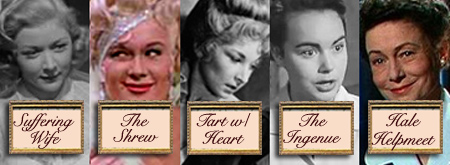 We are pleased to welcome StinkyLulu back to Smackdowning. Give him a warm welcome in the comments! - Editor
We are pleased to welcome StinkyLulu back to Smackdowning. Give him a warm welcome in the comments! - Editor
It has been a while since I dropped into a random year’s field of Supporting Actress nominees. Still, as I have re/screened the relevant films in preparation for Saturday afternoon's Supporting Actress Smackdown, it’s startling how familiar the 1952 roster feels. Remember that “Best Supporting Actress” was only in its 15th year or so (having been introduced in 1936, almost ten years after the Oscar game got started) but, already by 1952, the category seemed to have established some of its most enduring quirks.
1952’s nominated roles are definitely cut from Oscar’s favorite cloth: the hooker with a heart; the hale helpmeet; the full force of youth; the long (briefly) suffering wife; and the shrewish “ex.”
 Oscar loves a type - you see these types still!
Oscar loves a type - you see these types still!
The field we'll be discussing Saturday definitely reminds us that, by the early 1950s, Supporting Actress had emerged as one of Oscar’s favored ways to anoint the newcomer/s with one hand, while taking care to honor the time-tested trouper/s with the other. As example, 1952's nominations honor not only breakout performances by “new stars” Jean Hagen and Terry Moore (not to mention the screen debut of Colette Marchand) but also familiar work by previously favored nominees Gloria Grahame and Thelma Ritter. And, yes, Oscar’s habit of nodding to certain troupers also stirs the faint whiff that a Supporting Actress nomination might sometimes be an apology bouquet of sorts — Oscar’s way to say “please forgive my neglecting to nominate (or award) that other performance…but do accept this as a token of the Academy’s esteem.” (Might Grace Kelly’s 1953 nomination for Mogambo and Katy Jurado’s 1954 nomination for Broken Lance been made possible, at least in part, by Oscar’s neglect of their High Noon turns this very year?)
And in a field full of what I have called “coasters” (efficient supporting actressness buoyed by being part of a heavily nominated film), Jean Hagen’s nomination looms especially large as that “single nominated performance from an ignored-in-other-major-categories picture”. That's a particularly burdensome last bit of support not infrequently borne by Supporting Actress nominees.
 Katy Jurado (High Noon) and Ethel Waters (Member of the Wedding). Who would you call snubbed from '52's Supporting Actressing?
Katy Jurado (High Noon) and Ethel Waters (Member of the Wedding). Who would you call snubbed from '52's Supporting Actressing?
All told, 1952 stands as nearly exemplary of the idiosyncrasies of the Best Supporting Actress category, and is thus perhaps the ideal one to revive the peculiar pleasures of the Supporting Actress Smackdown. And while I might wonder what this roster might have felt like if, say, High Noon’s Katy Jurado or Member of the Wedding’s Ethel Waters (or even Viva Zapata’s Mildred Dunnock) had “coastered” into the field, the Smackdown challenges us to look closely at the work of the women who were nominated, for it is in such “actressing at the edges” that the category’s true pleasures shine.
See you on Saturday!